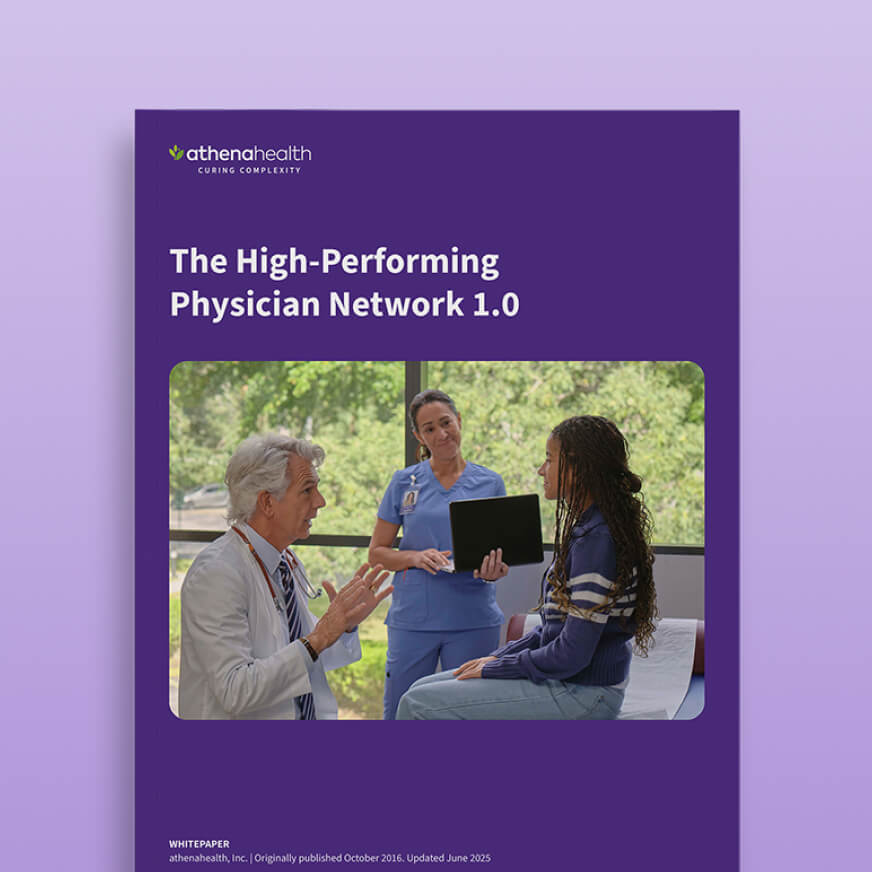When it comes to artificial intelligence (AI) in healthcare, too much of the conversation centers on the technology — what it can do, how fast it’s evolving, what’s next. But the real story isn’t the tech. It’s whether care feels better for the people giving and receiving it.
That belief led the athenaInstitute™ to partner with the United States of Care (USofC) on new research into how both physicians and patients truly view AI — its promise, its pitfalls, and its potential to transform care. By combining findings from our 2025 Physician Sentiment Survey with a national patient poll, we created one of the most comprehensive side-by-side views of how both groups see AI’s role in care.
USofC has long worked to elevate the patient voice in shaping healthcare policy, while athenahealth has a unique vantage point into the physician experience through our connected network of more than 170,000 providers. By bringing those perspectives together, we were able to answer an urgent question: how do doctors and patients really feel about AI — and what will it take for these tools to be trusted, adopted, and sustainable?
The findings confirm that both patients and physicians see enormous promise in AI, but also potential limits.
Physicians are adopting AI tools at a rapid pace, especially in areas like documentation, where 68% reported increased use this year. Many say AI is helping improve the quality of their notes and reducing the time they spend charting after hours. These are meaningful wins: freeing doctors from administrative work allows them to focus more on the human side of medicine. Doctors tell us they want AI to act like an assistant in the background — reducing clicks and after-hours charting — not a gatekeeper between them and patients.
But enthusiasm has boundaries. More than half of physicians (58%) worry about overreliance on AI for diagnosis and the risk of eroding the patient-provider relationship (61%). Physicians welcome AI when it works quietly in the background — streamlining tasks and surfacing insights — not when it is used to mediate or replace human judgment.
Patients, on the other hand, are still forming their views. Awareness is growing — nearly half know AI already plays a role in areas like medical records, imaging, and prior authorizations — but comfort depends on context. About half of patients are fine with AI helping to record notes or analyze data, but far fewer are comfortable with AI diagnosing conditions or planning treatment.
Across all groups, transparency matters: 77% of patients say they should be told when AI is used in their care. Choice matters, too: people want to understand how it’s used, and to opt out when it doesn’t help.
Equity is another theme that can’t be ignored. Black adults are significantly more likely than white adults to worry that AI could increase bias while Hispanic adults expressed greater trust in AI if organizations proactively addressed bias and promoted fairness. For communities long affected by healthcare inequities, skepticism is understandable. And it underscores our collective responsibility to ensure AI closes gaps, not widens them.
People want to understand how AI is used in their care, and to opt out when it doesn’t help
The work ahead
This research gives me confidence that we’re asking the right questions. It shows us that the success of AI in healthcare won’t be measured by how many tools are launched or how quickly adoption climbs. It will be measured by whether doctors feel AI helps them practice medicine more sustainably and whether patients feel informed, respected, and in control of their care.
For me, the biggest takeaway is that AI adoption is not the same as acceptance. Physicians are experimenting with AI and, in many cases, already seeing benefits. Patients are aware of it and cautiously open to its use. But both groups still need to be convinced that AI is trustworthy, equitable, and human-centered. Trust is earned in use.
That’s where companies must lead. At athenahealth, we’re building human-centered AI that cures complexity rather than adding to it — earning trust through transparency and accountability. And we need to keep listening — to patients, providers, and communities — to ensure these tools solve real problems and don’t create new ones.
Our partnership with USofC is just the start. It’s a roadmap for designing innovation around the voices that matter most — physicians and patients. Together, we are fielding qualitative and quantitative research about how AI works on the front lines of care. Read the full athenahealth-USofC report and follow our blog series as we dive deeper into physician and patient insights — and its implications for the future of AI in healthcare.
The future of AI in healthcare depends on trust. When we build it with and for the people who use it, technology becomes a force for better care, not just faster care. That is the opportunity in front of us.
More athenaInstitute resources
Continue exploring
- The 2025 Physician Sentiment Survey was conducted by The Harris Poll from January 2-15, 2025. The total population for the 2025 survey was a pool of 1,001 physicians, consisting of 750 primary care providers (PCPs) and 251 specialists. In 2025, 6% of the total sample use athenahealth as their primary Electronic Health Record (EHR). athenahealth’s sponsorship of the survey was not revealed.
- The 2024 United States of Care National poll on AI was conducted in partnership with Morning Consult between May 30-June 2, 2024 among a sample of 2,517 adults. The interviews were conducted online, and the data were weighted to approximate a target sample of adults based on age, gender, race, educational attainment, region, gender by age, and race by educational attainment. Results from the full survey have a margin of error of plus or minus 2 percentage points.










